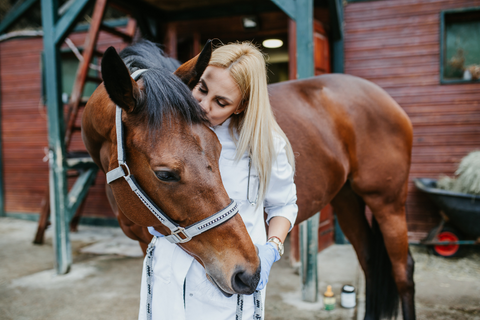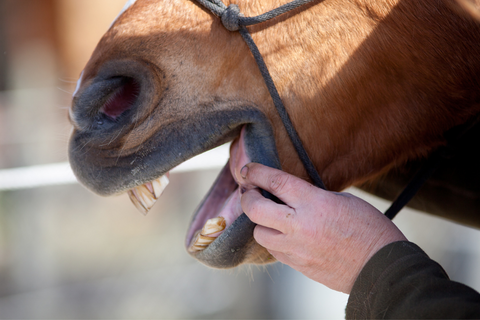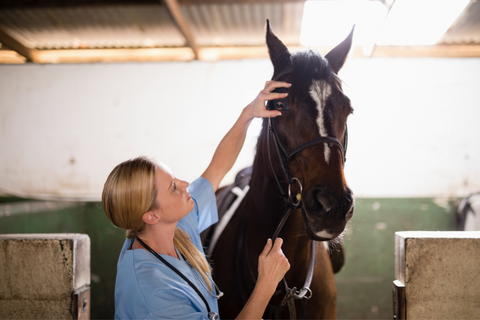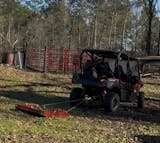How often you deworm a horse depends on age, environment, and parasite levels in your area. Many veterinarians now recommend using fecal egg counts (FECs) to guide deworming decisions instead of deworming on a fixed schedule. The goal is targeted treatment that protects horse health while reducing parasite resistance.
Key Takeaways
-
Deworming helps prevent parasite-related issues like weight loss, colic, and digestive upset
-
Deworming frequency varies based on age, living conditions, and local parasite pressure
-
Many vets recommend fecal egg counts (FECs) before choosing a deworming plan
-
Dewormers target different parasites, so product choice matters
-
Most horses tolerate deworming well, but severe reactions require a vet call
Deworming is an important aspect of caring for your horse. It's a huge and sometimes overlooked component of caring for your equine friends - and it can be a bit overwhelming, if I'm honest. One frequently asked question about deworming is how often should you deworm a horse?
When I was a first-time horse owner, I had no idea how often my horse needed deworming. There were plenty of opinions, and I was lucky enough to have an accessible vet and a knowledgeable barn manager to guide me in that respect.
Knowing when to deworm, the types of dewormers available, potential side effects, and when to get your vet involved can be a complex process IF you're unfamiliar with it.
We're going to jump right into discussing how often you should deworm your horse. Then, we are going to cover how to deworm a horse, so you can leave here today with a thorough understanding of equine deworming. It's not a glamorous topic, but your horse will thank you!
Why is Deworming Important?
Because, ew! But in all seriousness, worm infestations in horses can lead to so many health issues, ranging from mild discomfort to serious illness or even death. Common worms with horses include strongyles, roundworms, tapeworms, and bots.
These parasites can cause gastrointestinal disturbances, weight loss, colic, diarrhea, and even damage to internal organs. As horse owners, we prefer to avoid ALL of these things.
Regular deworming helps to control worm populations so you can reduce the risk of infestation and minimize the potential for health problems that will stem from it. You'll also contribute to the overall health and performance of your horse so they can excel at whatever it is they do - from racehorse to beloved pasture puff.
How Often Should You Deworm a Horse?

The frequency of deworming depends on various factors. These include the age of your horse, living conditions, and the prevalence of local parasites (some climates just naturally have more than others).
Once upon a time, we would deworm horses every six to eight weeks, but if you have a little
deworming experience, you probably raised your eyebrows at that frequency. Concerns over parasite resistance and the development of more targeted deworming strategies forced the approach into evolution.
Today, most veterinarians recommend performing fecal egg counts to assess how many worms your horse has before administering or recommending a dewormer. Fecal egg counts (FECs) will tell you if your horse actually needs deworming - and with what.
Horses with low parasite burdens (or a low worm count...see what I did there?) may require less frequent deworming, while those with higher burdens may need more frequent treatment. This part is relatively straightforward!
Let's move on to the types of dewormers!
Types of Dewormers
Several types of dewormers are available for your horse, each targeting specific types of parasites. You don't always have to go through your veterinarian to access them. Many are available at local farm and livestock stores (like Country Max or Tractor Supply) or from online retailers like SmartPak, Valley Vet, and Chewy!
Here's a general overview:
- Benzimidazoles (e.g., fenbendazole, oxibendazole): Effective against strongyles, roundworms, and some tapeworms.
- Macrocyclic lactones (e.g., ivermectin, moxidectin): Broad-spectrum dewormers that target a wide range of parasites, including strongyles, roundworms, bots, and some tapeworms.
- Pyrantel pamoate: Effective against strongyles and roundworms.
- Praziquantel: Specifically targets tapeworms.
Ask your vet about rotating dewormers to prevent parasite resistance from developing. They'll be able to advise on the most suitable deworming protocol for your horse based on factors such as age, health status, and what the parasites are like in your area.
How to Deworm a Horse

Knowing how to deworm a horse is a useful skill to have as a horse owner. Deworming a horse can be done orally using paste or gel formulations.
Here's a quick step-by-step guide:
- Determine the appropriate dewormer based on your veterinarian's recommendation or FEC results.
- Calculate the correct dosage based on the horse's weight.
- Administer the dewormer orally using a specialized syringe, following the manufacturer's instructions.
- Monitor the horse for any adverse reactions or signs of discomfort.
If you're unsure how to get your horse to take an oral medication,
Here are a few tips straight from my own experience.
- Make sure they haven't eaten anything right before deworming. Save the cookies or handful of hay for AFTER the meds.
- Gently insert the syringe into the corner of the mouth and push it back as far as you can, kind of like where you place your thumb when you want them to open up for a bit.
- Push quickly and, if possible, hold their head up so most of the meds go down the hatch.
Keep your own mouth closed because you'll likely face a trickling situation, or in some cases, a waterfall of dewormer, coming back at you. Don't stress. You've done your best and can always deworm again if they need another dose.
What to Expect and Potential Side Effects of Deworming
I have never had a horse have adverse effects from dewormers. In most cases, deworming is well-tolerated by horses and rarely causes significant side effects.
However, some horses may experience mild reactions such as drooling, lip smacking, or reluctance to eat immediately after deworming. These symptoms usually resolve within a short time and are not cause for concern.
In rare instances, horses may have allergic reactions to dewormers, manifesting as hives, swelling, or difficulty breathing. If you notice any severe or persistent side effects, get in touch with your veterinarian right away.
When to Call a Veterinarian

While horse owners can perform routine deworming, certain circumstances warrant veterinary intervention. These include:
- Persistent or severe signs of parasite infestation despite deworming
- Adverse reactions to dewormers
- Presence of unusual or concerning symptoms in the horse
If you're worried for any reason, call your vet. They're used to panicked owners, and nobody will think any less of you for calling and expressing your concerns. It's always better to be safe than sorry; vigilant owners catch problems before they evolve!
Complications from Worms
Failure to adequately control worm infestations in horses can lead to various complications. When the worms are out of control, your horse could experience:
- Weight loss and poor condition.
- Colic, which can be life-threatening.
- Gastrointestinal disturbances.
- Reduced performance and productivity.
- Damage to internal organs, such as the liver or intestines.
Regular fecal testing and deworming, along with good management practices, can help minimize the risk of these complications.
Areas of the US Where Deworming is Especially Important
While deworming is essential for horses regardless of location, certain regions may have higher parasite populations, making it even more critical. Warmer clients with high humidity may find parasites more challenging than cold, dry climates.
Regions with dense horse populations or where horses are housed together may have increased parasite transmission rates.
Keep Those Paddocks Clean to Help Minimize Worm Transmission
Deworming is a fundamental aspect of equine healthcare, vital for maintaining the health and well-being of horses. By understanding how often to deworm, the types of dewormers available, and when to involve a veterinarian, you can effectively manage parasite infestations. We all want to make sure our horses lead happy, healthy lives. Work closely with your veterinarian to develop a deworming protocol tailored to your horse's specific needs and circumstances.
As well as targeted deworming, there are other things you can do to help minimize worm burdens and transmission. Regardless of where you keep your horse, it's essential for you to clean up after them...and yes, I mean manure! Get it out of their stalls, run-in sheds, pastures and paddocks because an accumulation of poo will absolutely lead to an abundance of parasites.
Paddock Blade is a premium, American-made poop scooper for horses. Built to last and designed to work with a range of towing vehicles, Paddock Blade can save you 70% of your paddock cleaning time, and 90% of your paddock cleaning effort. There’s no assembly required, so you can dive straight into cleaning your paddocks quickly, easily and effectively.
Shop the Paddock Blade poop scooper for horses today.
Good luck and happy paddock cleaning!

Frequently Asked Questions
1. How often should I deworm my horse?
It depends on age, environment, and parasite risk. Many vets recommend using fecal egg counts to decide how often treatment is needed.
2. What is a fecal egg count (FEC)?
It’s a test that helps estimate how many parasite eggs your horse is shedding, which helps guide targeted deworming decisions.
3. Can I buy dewormer without a veterinarian?
Many dewormers are available in stores and online, but your veterinarian can help you choose the right product and schedule.
4. What are common side effects after deworming?
Some horses may drool or act mildly uncomfortable for a short time. Severe reactions are rare but require a vet call.
5. What else can I do to reduce worms besides deworming?
Regular manure removal and good turnout hygiene help reduce parasite exposure and transmission.
TL;DR
How often you deworm a horse depends on age, living conditions, and parasite levels in your area. Many veterinarians now recommend fecal egg counts (FECs) to guide treatment instead of deworming on a fixed schedule. Dewormers target different parasites, most horses tolerate them well, and a veterinarian should be involved if symptoms persist or a reaction occurs. Regular manure cleanup also helps reduce parasite transmission.




